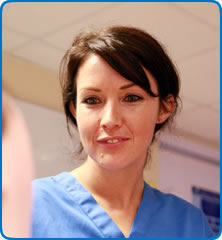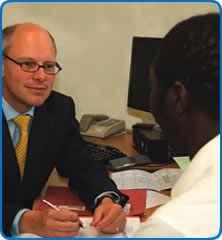Idiopathic Parkinson’s disease
The most common symptoms of Idiopathic Parkinson’s disease (IPD) are tremor, stiffness and slowness of movement. It results from a loss of nerve cells in the brain that produce a chemical called dopamine. The cause of Parkinson’s disease is not fully understood. Currently, it's believed a combination of genetic changes and environmental factors may be responsible for the condition. The symptoms of Parkinson’s disease can vary greatly between individuals. Although there is no cure for Parkinson’s disease, there are a wide variety of medications and therapies that can be used to help with the symptoms.
www.parkinsons.org.uk
www.cureparkinsons.org.uk
Multiple System Atrophy
Multiple system atrophy (MSA) is a progressive neurological disease that causes nerve cells to shrink in different areas of the brain. This results in problems with movement, speech, balance and often difficulties with bladder function and blood pressure control. It can be a difficult condition to diagnose especially in the early stages. There is no cure for MSA but the best treatment usually involves a combination of medication and specialised input from therapists to manage different symptoms.
www.msatrust.org.uk
Progressive Supranuclear Palsy
Progressive supranuclear palsy (PSP) is a disease that occurs when brain cells in certain parts of the brain are damaged as a result of a build-up of a protein called tau. The condition leads to symptoms including loss of balance, slowing of movement, difficulty moving the eyes, and problems with speech and swallow. PSP may be mistaken for other neurodegenerative diseases such as Parkinson’s disease. The cause of the condition is uncertain. There is no cure for PSP but patients can benefit from having medications to manage different symptoms as well as input from therapists which can help improve their quality of life.
www.pspassociation.org.uk
Corticobasal syndrome
Coticobasal syndrome (CBS) is caused by the abnormal accumulation of the protein tau in certain nerve cells in the brain. People affected by CBS may present with cognitive, movement or language symptoms as the first sign. It can be difficult to diagnose, especially in the early stages. Individuals with CBS are easier to diagnose if they are showing limb apraxia, such as no longer being able to use the remote control for the television set, or not being able to retrieve mail from the mailbox. Initial symptoms of CBS often begin around age 60. Patients are sometimes tried on medications used to treat Parkinson’s disease but these are usually not effective. Patients may benefit from occupational therapy, physiotherapy and speech therapy.
www.pspassociation.org.uk
Essential Tremor
Essential tremor (ET) is the most common neurologic movement disorder, and is 8–10 times more prevalent than Parkinson's disease. In some people, the tremor may be relatively non-progressive and may be mild throughout their life. In other people it may slowly progress over the years and can impair their ability to do certain tasks. It typically affects the hands and arms, though sometimes may also involve the head, voice, trunk and legs. Treatments available include medications and in more severe cases surgery may be an option.
https://tremor.org.uk
Dystonia
In dystonia, faulty signals from the brain cause muscles to spasm and pull on the body incorrectly. This forces the body into twisting, repetitive movements or abnormal postures. Sometimes the symptoms are accompanied by dystonic tremor. Various treatments are available for dystonia, depending on the type and severity a person has. The main options are drugs, physiotherapy, botulinum toxin and surgery.
www.dystonia.org.uk
Tic Disorders
Tic disorders often start in childhood with abrupt involuntary movements and uncontrollable sounds. Many patients will experience co-occurring conditions which might include Attention Deficit Hyperactivity Disorder (ADHD), Obsessive Compulsive Disorder (OCD), and Anxiety. Tics often seem to run in families, and there is likely to be a genetic component in many cases. If tics are mild they may not need treatment but some patients can benefit from medications or behavioural therapies.
www.tourettes-action.org.uk/
Functional movement disorders
Functional Movement Disorders (FMD) are among the most common reasons for patients to present to a movement disorder specialist. Symptoms include tremor, dystonia, chorea, jerky movements and walking problems. The brain of a patient with functional neurological symptom disorder is structurally normal, but functions incorrectly. Patients with FMD can benefit from graded exercise/physiotherapy, cognitive behavioural therapy and medication to help pain and sleep.
www.neurosymptoms.org
https://fndhope.org/
Restless Leg Syndrome
Restless legs syndrome (RLS) is a disorder that causes an unpleasant or uncomfortable sensation in the legs resulting in a strong urge to move them. This is often described as aching, tingling, or crawling in the legs. Occasionally the arms may also be affected. The feelings generally happen when at rest and therefore can make it hard to sleep. Due to the disturbance in sleep, people with RLS may have daytime sleepiness, low energy, irritability, and a depressed mood. It can often improve with medication.
 The Endoscopy service at North Bristol NHS Trust provides a full range of endoscopic techniques including:
The Endoscopy service at North Bristol NHS Trust provides a full range of endoscopic techniques including:
 We have a dedicated multidisciplinary team with expertise in the management of Parkinson’s disease and other movement disorders. We provide diagnosis, assessment and treatment for a full range of movement disorders, including but not limited to:
We have a dedicated multidisciplinary team with expertise in the management of Parkinson’s disease and other movement disorders. We provide diagnosis, assessment and treatment for a full range of movement disorders, including but not limited to: